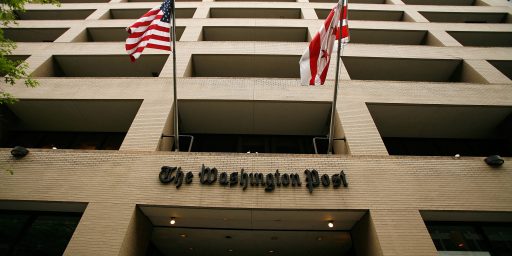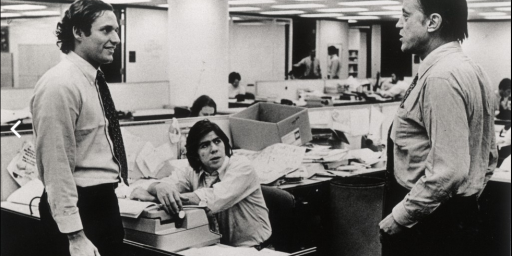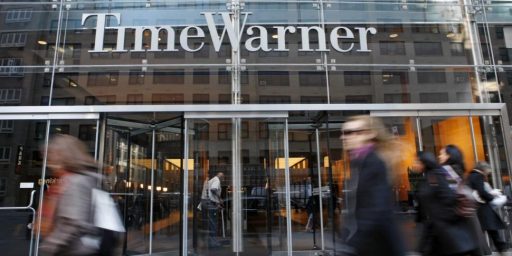Mainstream Press in Freefall
 Two prestige brands are joining a growing number of major press outlets undergoing restructuring or worse this week. NPR is cutting 7 percent of its staff, suffering from a crash of the stock market that has significantly hurt its endowment and from a noticeable decline in corporate underwriting. Newsweek is cutting 11 jobs, slimming the number of pages, and slashing guaranteed circulation. This comes in a week when the Tribune Company, owner of the Chicago Tribune, Los Angeles Times, and Baltimore Sun has filed for bankruptcy; the NYT is leveraging its building for operating expenses; and the Rocky Mountain News has been put up for sale.
Two prestige brands are joining a growing number of major press outlets undergoing restructuring or worse this week. NPR is cutting 7 percent of its staff, suffering from a crash of the stock market that has significantly hurt its endowment and from a noticeable decline in corporate underwriting. Newsweek is cutting 11 jobs, slimming the number of pages, and slashing guaranteed circulation. This comes in a week when the Tribune Company, owner of the Chicago Tribune, Los Angeles Times, and Baltimore Sun has filed for bankruptcy; the NYT is leveraging its building for operating expenses; and the Rocky Mountain News has been put up for sale.
As massive as a collapse of the Big 3 automakers could be, at least there’s comfort in the fact that manufacturing is an early 20th century enterprise that has naturally become a comparative advantage of the developing world. Journalism, by contrast, is a white collar knowledge industry of the type that we’ve been preparing our kids to enter for decades. Then again, newspapers have been dying off for decades, with only a handful of cities able to support more than one paper.
Jeff Jarvis argues that “Rupert Murdoch is now the great shining hope of journalism” because “Murdoch is the one mogul with brains willing to invest in journalism. But note well that he’s investing in national journalism.”
WaPo business columnist Steven Pearlstein is thinking along similar lines:
[T]he only way to produce a good product is for there to be massive consolidation in the industry, so that economies of scale can be achieved. But to date, we cling to these outdated notions that every city of 25,000 people needs its own daily newspaper. Not only can’t those papers be very good at delivering a full range of local, national and international news and features, but their existence makes it difficult for even the big metro papers to have enough circulation (scale) to do that.
That’s exactly right. In the Internet age, it’s silly for even mid-major papers such as the Dallas Morning News or Atlanta Journal-Constitution to in the national and international news business. They should cede that territory to the NYT, WaPo, WSJ and the like and instead be really great at covering state and local news, politics, and sports.
Still, even Pearlstein is stuck in the past:
What is also needed, however, is for the public to finally realize that there is no free lunch, that advertisers are no longer willing or able to pay for the cost of news collection, and that if people want quality news, they are going to have to pay for it just like any other good. If they are willing to pay $2 each morning for a cup of coffee, then they should willing to pay at least that much for a good newspaper.
I’m a news junkie. I don’t take the newspaper anymore, despite my “local” paper being the Washington Post, which is a great paper. I take the Sunday edition for the coupons and supplements and toss the rest in the recycle bin, preferring to read it online. Indeed, they constantly badger me to take the other six days for free and I found that it was just too much trouble to collect it every day, so I’ve stopped allowing them to deliver it.
The future of the newspaper business isn’t selling papers. Outside of cities with lots of public transport commuters, newspapers are something old people read because they’re still in the habit.
Appearing on NPR’s Dian Riehm show yesterday, Jarvis argued that major papers like the WaPo and WSJ should work out syndication arrangements with local papers and do content sharing, mostly on the Web, and also share revenue that results from the cross linkage. I’m not sure that’ll work, either, but it strikes me as a much more plausible way ahead than the $2 newspaper.
Photo by Flickr user marcelgermaine under Creative Commons license.






I think we’re conflating several different, interrelated phenomena. The first is that newspaper advertising revenues are collapsing under pressure from competition. That’s been going on for more than 70 years; it’s no surprise. The second is that structures in the print journalism business haven’t adjusted to the changing revenue picture. Salaries at the very top have obviously been too high for decades; shareholders’ earning were obviously too high (no longer, of course); newspapers have been burdened with difficult union contracts, particularly in the period 1955-1980 when the most good could have been done. Why didn’t newspapers respond adequately to the changes they knew were happening? Other than that they didn’t feel like it? And that they weren’t as nimble as they should have been because they were encumbered?
But there’s a third thing: newspapers have been conglomerated through leveraged buyouts in which the entities being purchased were burdened with the debt incurred by the purchase. I’ve always thought that was foolish in an industry with structural problems. I think that particular business model has collapsed from bad assumptions.
Before we can decide what the solution for the newspaper biz is, we need to disaggregate the effects of the various different problems. I think there’s probably room in the new media picture for traditional newspapers—just not with all the debt from decades of leveraged buyouts.
Until that happens I’m not sure we can draw any conclusions about economies of scale.
There is something else that wasn’t mentioned that I think is important to us news junkies.
Local journalism is very important. The reason is the same as can be illustrated by the electoral college. You don’t want large conglomerate news orgs to be the only place where news is published. You lose objectivity, independent investigative reports, and many people just want to know what’s what with local news.
While I believe the typical news org has been shooting itself in the foot by not vetting journalists with plagiarists , fact checking etc, there has to be a successful model in running a money making newspaper.
To lose local news media isn’t a bad thing as long as it’s replaced by something more efficient, more open, more honest.
I worked for a newspaper, a weekly, which was losing money until 1998, and then started a long run of gradually increasing profits, seeing revenue grow by 50 percent between 2000 and 2006, a float that is more than enough to see it through the current (hopefully temporary) crash.
How? By not letting our news product atrophy. By making sure we were number one in our market for news. By making sure we were number one in our market for presentation and quality. By understanding that our market was a regional one and not just one particular community. And by zealously protecting our classified ad base. We did all this in the face of tough competition from other overlapping papers and local radio. And guess what? They all manage to stay in business too, in more or less the same kind of way. Of course, we all had another in-built advantage. Every one of the key players in this market is privately held, either as an independent business or as part of a small regional chain.
Most of the MSM in the print world have conspicuously failed in all of these areas. Pap and filler are served up as news, whether one-source stories generated by their own “reporters” or pablum masquerading as “world news” downloaded from the AP. Newspapers are constantly redesigned but never better organized. Most newspapers have shrunk their market to their home town rather than reaching out to neighboring ones that are economically connected for economies of scale. They have given up their classifieds to Google and Craigslist. And after making all these mistakes they’re still expected by the stock market that trades their publicly-listed shares to produce profit margins that are only sustainable on a short-term basis, through shredding quality and customer value. It is simply not a sustainable business model.
If the major metro papers collapse, I expect that we’ll see a resurgence in small community weekly and daily papers, except that there is one serious caveat; can they wrest that classified stream back from Google and Craigslist? If they can’t we will have to hope that blogs, with their miniscule costs, can somehow pick up the slack, or our democracy will be poorer for it.
DBX supports exactly the point I was making: there’s room for traditional newspapers. I suspect the paper he was working for didn’t have a lot of debt.
I hope NPR lays off this old bag of bones. They should put her in a kayak, drop it into the Potomac and send her off to sea to be devoured by sharks.
Also: on papers. The Trib, for instance, makes money. The problem began a decade ago when ownership moved from privately-held, largely family orgnizations to public conglomerate corporations.
Stockholders of major media conglomerates like the Tribune company demanded massive profit percentages and were not really concerned with the public obligation of journalists (which family firms tended to honor).
Thus, you have insane things like Zell’s buyout which was a windfall for former Trib stockholders, required very little investment on the part of Zell, but was financed by leveraging employee pension plan.
The reason for the Trib’s current bankruptcy is directly because of the risky financing scheme–not because of the papers profitibility.
That’s right. You’ve got to disaggregate the problems that newspapers are having (which are real) from the problems caused by acquisition.
This brings up another question I’ve had for a long time–Why do European papers seem to be thriving?
I have no expertise in how the newspaper business is run–however, I travel to London at least four times per year and am always struck by the sheer amount of newspapers.
Granted, London is a metro area of about 7 million people, but they must have at least 8 or 9 newspapers. When you go on the Continent, as well, major European capitals all seem to have at least 3 dailies, sharing space on the newsstand with the Interantional Herald Trib and the FT.
As an aside, the British press seems to be out front on marketing. Many of the papers give free DVDs out as premiums. For a sucker like me I always wind up buying a paper that gives away a free DVD. I’ve got a stackful of DVDs on “The British at War” and somesuch topics. I had to buy a damn region-free DVD player for the suckers!
I have never seen this done in the US.
DBX you said:
I couldn’t agree more with you. I think that there is a place for local journalism. Revenue streams need to be creative to solicit readers/buyers, but also cheap enough to make it worth investing/selling.
I have personally contemplated starting a local newsletter/weekly reader because I believe I could do a better job. I can only conclude that the massive hemorrhage of mass media is because they advertise like the common spammer, and leave readers without meaningful content.
Triumph:
Here in the States papers have delusions of grandeur.
.
To the quicker, in which this organization stumbles off the horizon into, into political obscurity, the better off we will all be.
There is no room, no reason, no financial justification to keep a government-run news organization on the air.
Newspapers are so so liberal that conservatives should band together and publish a Sunday supplement (like Parade magazine) that would be distributed with the local Sunday paper and would rebut that week’s liberal news stories.
It is a potentially big big revenue source for the liberal rags. I can’t believe I am giving this idea away for nothing.
re: Triumph at December 11, 2008 12:16 Permalink
I assume you are being serious with these comments so I’m just curious…what’s your problem with Diane Rehm?